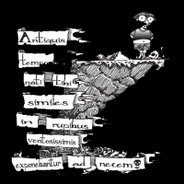Science/Fiction
So, the other day, I realized that it had been far too long since I'd read any science fiction, and I thought this was extremely strange. I'm a tried and true science fiction fan. I grew up on the stuff, I cut my teeth writing the stuff (which is why you should write with your fingers, and not your teeth) and I deeply enjoy it.
Yet, I looked over my bookshelves, my TV shows, my movies, and I realized that Sci-Fi just wasn't on the list. Unless you count things like old Star Trek re-runs, Babylon 5 reruns, and maybe if you count Heroes. That's about it.
Very strange. I got to wondering why.
So I went back further, digging into the sci-fi books that I'd last bought, and trying to figure out why I'd drifted off-course, as it were. I realized that about around the time I discovered Neil Gaiman, I trifted into that type of fantasy and away from sci-fi.
I did figure out why, eventually, and this is why:
Science Fiction, to me, became like high fantasy (a la' Robert Jordan, Terry Goodkind, et al) which I also completely fail to get. That is to say, somewhere along the road, it became so complicated and so in-depth that I felt like I'd lost the plot and I, without meaning to, wandered off.
(This is probably just me, mind you; if you agree, good, otherwise just assume I'm blithering and move thee on.)
The science fiction books of Greg Bear and Kim Robinson, or the books of M. John Harrison for example completely fail to interest me. They're detailed and heavy and strongly science based. They are deep and involved and increasingly scientific. At least by me, it began to feel like I needed to do extra reading in order to follow the books, or needed to have had some really serious college education toward quantum physics before I could really enjoy the book.
Why is this? Truthfully, I'm not sure. I will still happily read Isaac Asimov, even though he spent a great deal of time talking about all manner of scientific detail. That said, as I think back on all the Asimov I've read in my life, I can recall Hari Seldon, the Mayors of the Foundation, Elijah Bailey, R. Daneel Olivaw, Gladys, and so on. All sorts of characters. I can vaugely recall the science of Hari Seldon and yet, as I tried to finish this sentence, I just realized I don't remember what it's called.
I guess the reason I drifted away from a lot of science fiction is that I'm very much in favor of people stories. All stories are people stories, but sometimes there are swaths of information piled on top, layering what can otherwise be a simple story into a thick and complicated tale. (Which is not necessarily a bad thing. I don't want simple stories, mind you.)
So, of late, I've started writing some science fiction stories, and they have very little actual hard science in them, because I guess that's just me. I've started reading some sci-fi again, and it also doesn't have a lot of hard science. When it comes to books, I think I prefer space opera to hard science.
Realizing that, I realized that when I went to Barnes & Noble and specifically looked for sci-fi there was A) Less sci-fi than fantasy and B) Less people story-science fiction than hard science. More William Gibson than Robert A. Heinlein, to make a comparison.
I'm not saying the system's broken. They sell. People buy 'em, and read 'em. I think it's probably just me having one of those figuring-out-the-world moments.
So, er, to bring this around to a point...those of you out in the world who are writing urban fantasy novels? C'mon. Go write me some space opera. Put some people on some space ships and throw them out at weird angles in the universe, and see what happens.
And then tell me about it. Because I like me some people stories.




4 comments:
I couldn't agree more, Pete.
I think the main problem with SF in general, but specifically Hard SF, is the expositional nature of the writing. Even the best Hard SF writers have to spend so much time explaining the workings of their version of the future, that it often interferes with the story. And to quote Stephen King "All things must serve the story"
I also find this problem in what you called "High Fantasy," with worldbuilding. Often writers create such complicated worlds in which to set their stories that the reader has to slog through 800 pages of nonsense to begin to even define characters and places, which makes it difficult to be interested in the development of the story.
However, there are lots of readers out there who love this sort of stuff, and feel it aids in the "escape.",
There are many publishers, for example, who wont even consider a fantasy novel unless the author can prove they have at least a trilogy. Never mind that the story might not take a friggin trilogy to tell.
As for your shrinking SF sections in booksstores, it's true, and whats the fastest growing?
Horror.
10 years ago publishers weren't touching horror novels,and now they are printing them as fast as their greedy little hands can.
So, get thee writing some horror.
It's funny that this topic - drifting away from SciFi, is the third Science Fiction post to the blog :)
I think nerds have killed sci-fi. My brother is a giant nerd and he almost stopped reading 'Snow Crash' when Stephenson described a pigtailed fiber-optic cable, which apparently is impossible.
I'd be terrified to write anything sci-fi as it would no doubt provoke 'Oh how little you know about string theory' from thousands of Comic-Book Guy clones.
Speaking of CBG, next time you read 'Confederacy of Dunces', imagine Ignatius sounding just like CBG. it makes the book even FUNNIER.
Anonymous, it did occur to me when writing it that this was the third post that essentially complained about sci-fi, and so I wasn't going to write it. I was going to write on a different subject.
...Er, and then Lucien e-mailed me and pointed out that I had missed the deadline and was a day late in posting. And so I posted it anyway.
I believe it was Neil Gaiman who said something along these lines:
"Science fiction was important, in that it showed us the future we were striving for, before we got there. But now, we're there, we're living in it, and we who wrote science fiction find ourselves unsure of what happens next."
Post a Comment